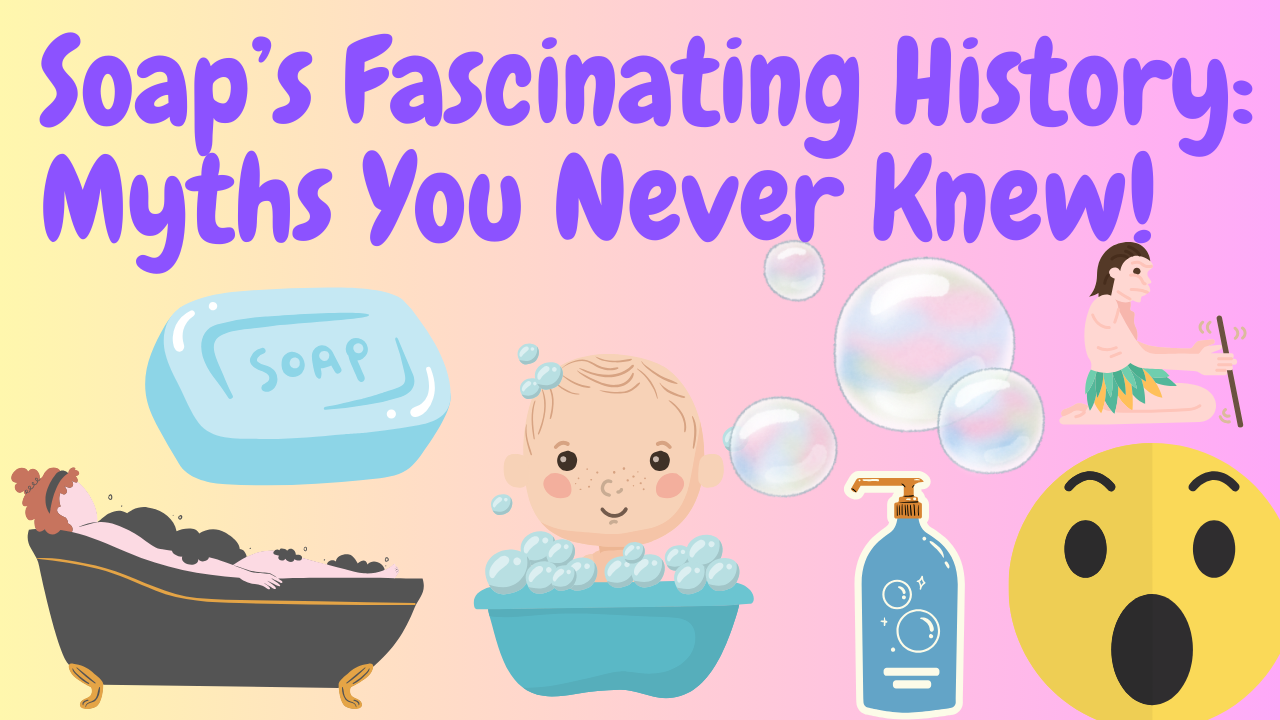Soap has a long, fascinating history, dating back thousands of years when ancient civilizations sought ways to stay clean. But the story of origin and evolution of soap goes far beyond just cleanliness—its journey is packed with strange uses, wild myths, and surprising facts that may make you rethink that bar of soap in your bathroom!
The Origins of Soap (Evolution of Soap)
Soap was first discovered around 2800 BCE in ancient Babylon, where archeologists found clay cylinders containing a soap-like substance. Early forms of soap were made from a mixture of water, alkali, and animal fats, and were primarily used for cleaning textiles, not human bodies. It wasn’t until ancient Egypt that soap began to be used for personal hygiene, with records indicating that Egyptians combined vegetable and animal oils with alkaline salts to create a primitive soap for washing.
The Romans, famed for their elaborate bathhouses, also adopted the use of soap but primarily as a medicinal item rather than for cleanliness. It wasn’t until the fall of the Roman Empire that the knowledge of soap-making spread throughout Europe.
The Middle Ages: Soap Loses its Shine (Evolution of Soap)
During the Middle Ages, soap’s popularity declined, especially in Europe. Oddly enough, personal hygiene wasn’t a priority for many during this period. In fact, there was a myth that water could carry disease into the body, which discouraged frequent washing. As a result, soap-making became a small, niche craft, largely confined to monks and local artisans.
However, despite these odd beliefs, soap maintained some degree of popularity in the Islamic world, where innovations in soap production continued to flourish. Arabic texts describe soap being used for personal cleanliness as early as the 7th century, and the tradition of using soap for hygiene purposes was passed through the trade routes to Europe.
The Soap Renaissance: From Artisan Craft to Mass Production
The modern era of soap began during the Industrial Revolution. In the 19th century, advances in chemistry allowed for the creation of mass-produced soap, making it accessible to the general population. One major breakthrough was the development of sodium hydroxide, which revolutionized soap production. This was when familiar brands like Ivory and Pears emerged, with large-scale soap manufacturing booming as part of the growing demand for hygiene in industrialized societies.
Crazy and Interesting Soap Facts
- Soap for Battle: In 1916, during World War I, a soap shortage in Germany led to the rise of synthetic detergents. These alternatives to soap eventually became widely used in households and industries alike.
- Ivory Soap Floats: The famous floating Ivory soap wasn’t intentional! The company accidentally added too much air during production, but when they discovered how useful this was (because the soap floated in water), they marketed it as a feature.
- Ancient Roman Myths: Some Romans believed that soap was a magical substance that could protect people from evil spirits. It wasn’t just used for cleaning—it was considered almost a form of protection.
- Soap is Not Actually Anti-Bacterial: Ordinary soap doesn’t kill bacteria—it simply lifts them off the skin and allows them to be rinsed away with water.
Myths About Soap Use Over Time
- Soap is Poisonous: A strange myth from medieval times claimed that soap could poison the body through the skin. This led many people to avoid using it altogether.
- Soap Can Prevent Disease: During the plague years, people believed that frequent bathing with soap could attract the plague, as it supposedly opened the pores to the disease. This myth led to a decrease in soap usage during that time.
- You Can Never Be Too Clean: A more modern myth is that the more soap you use, the cleaner you’ll be. However, using too much soap, especially harsh varieties, can strip away natural oils and even harm the skin’s microbiome, leading to dryness and irritation.
Soap in the Modern Era (Evolution of Soap)
Today, soap is an everyday essential, and the market has exploded with a variety of options, from liquid and bar soaps to eco-friendly, vegan, and handmade varieties. However, the rise of liquid soap and hand sanitizers, especially during global events like the COVID-19 pandemic, has led to the decline of the traditional bar soap in some areas. Nonetheless, soap remains one of the most important tools in our fight against germs, continuing its legacy from the ancient world to modern households.
Conclusion: The Enduring Importance of Soap
From ancient Babylonian clay pots to modern bars scented with lavender or eucalyptus, soap has undergone a remarkable transformation. It’s become a symbol of cleanliness, health, and even luxury. Despite the strange myths and curious facts surrounding it, soap remains an essential tool for daily hygiene.
So, the next time you lather up, remember—you’re continuing a tradition that spans thousands of years!
Similar Blogs :
15 Mind-Blowing Facts About Cats You Never Knew
Did You Know? Fascinating Facts About Animals



